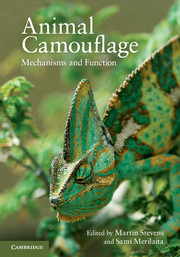Book contents
- Frontmatter
- Contents
- Contributors
- 1 Animal camouflage
- 2 Crypsis through background matching
- 3 The concealment of body parts through coincident disruptive coloration
- 4 The history, theory and evidence for a cryptic function of countershading
- 5 Camouflage-breaking mathematical operators and countershading
- 6 Nature's artistry
- 7 Camouflage behaviour and body orientation on backgrounds containing directional patterns
- 8 Camouflage and visual perception
- 9 Rapid adaptive camouflage in cephalopods
- 10 What can camouflage tell us about non-human visual perception? A case study of multiple cue use in cuttlefish (Sepia spp.)
- 11 Camouflage in marine fish
- 12 Camouflage in decorator crabs
- 13 Camouflage in colour-changing animals
- 14 The multiple disguises of spiders
- 15 Effects of animal camouflage on the evolution of live backgrounds
- 16 The functions of black-and-white coloration in mammals
- 17 Evidence for camouflage involving senses other than vision
- Index
- Plate section
- References
10 - What can camouflage tell us about non-human visual perception? A case study of multiple cue use in cuttlefish (Sepia spp.)
Published online by Cambridge University Press: 05 June 2012
- Frontmatter
- Contents
- Contributors
- 1 Animal camouflage
- 2 Crypsis through background matching
- 3 The concealment of body parts through coincident disruptive coloration
- 4 The history, theory and evidence for a cryptic function of countershading
- 5 Camouflage-breaking mathematical operators and countershading
- 6 Nature's artistry
- 7 Camouflage behaviour and body orientation on backgrounds containing directional patterns
- 8 Camouflage and visual perception
- 9 Rapid adaptive camouflage in cephalopods
- 10 What can camouflage tell us about non-human visual perception? A case study of multiple cue use in cuttlefish (Sepia spp.)
- 11 Camouflage in marine fish
- 12 Camouflage in decorator crabs
- 13 Camouflage in colour-changing animals
- 14 The multiple disguises of spiders
- 15 Effects of animal camouflage on the evolution of live backgrounds
- 16 The functions of black-and-white coloration in mammals
- 17 Evidence for camouflage involving senses other than vision
- Index
- Plate section
- References
Summary
Processes in the psychological plane cause us to overlook the fact that in the physical plane all optical effects whatsoever are fundamentally due to differences of colour and brightness, and of light and shade.
Cott (1940, p. 3)Accounts of camouflage reflect basic concepts about the relationship between sensory perception and the physical world. The twist is that whereas the discussion of this question normally refers to human perception we must now focus on non-human species. Cott's (1940) book on Adaptive Coloration in Animals remains the most valuable work on camouflage. Cott was familiar with the idea that to achieve verisimilitude an artist has to paint the physical patterns of light and shade created by three-dimensional surfaces. Naïve artists overlook these optical effects in favour of ‘higher-level’ objects. Only with skill and training is it possible to recover the ‘innocence of the eye’ that is needed to render naturalistic scenes on canvas (Cott 1940; Gombrich 1960). This reasoning led Cott to explicitly reject psychological interpretations of camouflage in favour of what he saw as ‘simple’ optical effects. Cott was however interested in the psychology of attention, as with the suggestion that high-contrast internal features distract the viewer.
Information
- Type
- Chapter
- Information
- Animal CamouflageMechanisms and Function, pp. 164 - 185Publisher: Cambridge University PressPrint publication year: 2011
References
Accessibility standard: Unknown
Why this information is here
This section outlines the accessibility features of this content - including support for screen readers, full keyboard navigation and high-contrast display options. This may not be relevant for you.Accessibility Information
- 5
- Cited by
